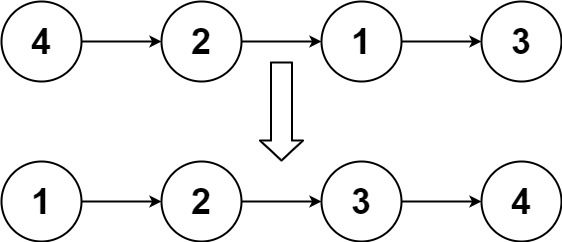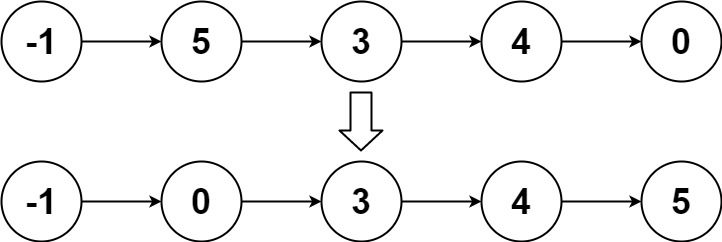给你链表的头结点 head ,请将其按 升序 排列并返回 排序后的链表 。
示例 1:
输入:head = [4,2,1,3] 输出:[1,2,3,4]
示例 2:
输入:head = [-1,5,3,4,0] 输出:[-1,0,3,4,5]
示例 3:
输入:head = [] 输出:[]
提示:
- 链表中节点的数目在范围
[0, 5 * 104]内 -105 <= Node.val <= 105
进阶:你可以在 O(n log n) 时间复杂度和常数级空间复杂度下,对链表进行排序吗?
# Definition for singly-linked list.
# class ListNode:
# def __init__(self, val=0, next=None):
# self.val = val
# self.next = next
class Solution:
def sortList(self, head: ListNode) -> ListNode:
if head is None or head.next is None:
return head
slow, fast = head, head.next
while fast and fast.next:
slow, fast = slow.next, fast.next.next
t = slow.next
slow.next = None
l1, l2 = self.sortList(head), self.sortList(t)
dummy = ListNode()
cur = dummy
while l1 and l2:
if l1.val <= l2.val:
cur.next = l1
l1 = l1.next
else:
cur.next = l2
l2 = l2.next
cur = cur.next
cur.next = l1 or l2
return dummy.next/**
* Definition for singly-linked list.
* public class ListNode {
* int val;
* ListNode next;
* ListNode() {}
* ListNode(int val) { this.val = val; }
* ListNode(int val, ListNode next) { this.val = val; this.next = next; }
* }
*/
class Solution {
public ListNode sortList(ListNode head) {
if (head == null || head.next == null) {
return head;
}
ListNode slow = head, fast = head.next;
while (fast != null && fast.next != null) {
slow = slow.next;
fast = fast.next.next;
}
ListNode t = slow.next;
slow.next = null;
ListNode l1 = sortList(head);
ListNode l2 = sortList(t);
ListNode dummy = new ListNode();
ListNode cur = dummy;
while (l1 != null && l2 != null) {
if (l1.val <= l2.val) {
cur.next = l1;
l1 = l1.next;
} else {
cur.next = l2;
l2 = l2.next;
}
cur = cur.next;
}
cur.next = l1 == null ? l2 : l1;
return dummy.next;
}
}/**
* Definition for singly-linked list.
* struct ListNode {
* int val;
* ListNode *next;
* ListNode() : val(0), next(nullptr) {}
* ListNode(int x) : val(x), next(nullptr) {}
* ListNode(int x, ListNode *next) : val(x), next(next) {}
* };
*/
class Solution {
public:
ListNode* sortList(ListNode* head) {
if (!head || !head->next) return head;
auto* slow = head;
auto* fast = head->next;
while (fast && fast->next) {
slow = slow->next;
fast = fast->next->next;
}
auto* t = slow->next;
slow->next = nullptr;
auto* l1 = sortList(head);
auto* l2 = sortList(t);
auto* dummy = new ListNode();
auto* cur = dummy;
while (l1 && l2) {
if (l1->val <= l2->val) {
cur->next = l1;
l1 = l1->next;
} else {
cur->next = l2;
l2 = l2->next;
}
cur = cur->next;
}
cur->next = l1 ? l1 : l2;
return dummy->next;
}
};/**
* Definition for singly-linked list.
* type ListNode struct {
* Val int
* Next *ListNode
* }
*/
func sortList(head *ListNode) *ListNode {
if head == nil || head.Next == nil {
return head
}
slow, fast := head, head.Next
for fast != nil && fast.Next != nil {
slow, fast = slow.Next, fast.Next.Next
}
t := slow.Next
slow.Next = nil
l1, l2 := sortList(head), sortList(t)
dummy := &ListNode{}
cur := dummy
for l1 != nil && l2 != nil {
if l1.Val <= l2.Val {
cur.Next = l1
l1 = l1.Next
} else {
cur.Next = l2
l2 = l2.Next
}
cur = cur.Next
}
if l1 != nil {
cur.Next = l1
} else {
cur.Next = l2
}
return dummy.Next
}/**
* Definition for singly-linked list.
* class ListNode {
* val: number
* next: ListNode | null
* constructor(val?: number, next?: ListNode | null) {
* this.val = (val===undefined ? 0 : val)
* this.next = (next===undefined ? null : next)
* }
* }
*/
function sortList(head: ListNode | null): ListNode | null {
if (head == null || head.next == null) return head;
// 快慢指针定位中点
let slow: ListNode = head,
fast: ListNode = head.next;
while (fast != null && fast.next != null) {
slow = slow.next;
fast = fast.next.next;
}
// 归并排序
let mid: ListNode = slow.next;
slow.next = null;
let l1: ListNode = sortList(head);
let l2: ListNode = sortList(mid);
let dummy: ListNode = new ListNode();
let cur: ListNode = dummy;
while (l1 != null && l2 != null) {
if (l1.val <= l2.val) {
cur.next = l1;
l1 = l1.next;
} else {
cur.next = l2;
l2 = l2.next;
}
cur = cur.next;
}
cur.next = l1 == null ? l2 : l1;
return dummy.next;
}// Definition for singly-linked list.
// #[derive(PartialEq, Eq, Clone, Debug)]
// pub struct ListNode {
// pub val: i32,
// pub next: Option<Box<ListNode>>
// }
//
// impl ListNode {
// #[inline]
// fn new(val: i32) -> Self {
// ListNode {
// next: None,
// val
// }
// }
// }
impl Solution {
pub fn sort_list(head: Option<Box<ListNode>>) -> Option<Box<ListNode>> {
fn merge(l1: Option<Box<ListNode>>, l2: Option<Box<ListNode>>) -> Option<Box<ListNode>> {
match (l1, l2) {
(None, Some(node)) | (Some(node), None) => Some(node),
(Some(mut node1), Some(mut node2)) => {
if node1.val < node2.val {
node1.next = merge(node1.next.take(), Some(node2));
Some(node1)
} else {
node2.next = merge(Some(node1), node2.next.take());
Some(node2)
}
}
_ => None,
}
}
fn sort(head: Option<Box<ListNode>>) -> Option<Box<ListNode>> {
if head.is_none() || head.as_ref().unwrap().next.is_none() {
return head;
}
let mut head = head;
let mut length = 0;
let mut cur = &head;
while cur.is_some() {
length += 1;
cur = &cur.as_ref().unwrap().next;
}
let mut cur = &mut head;
for _ in 0..length / 2 - 1 {
cur = &mut cur.as_mut().unwrap().next;
}
let right = cur.as_mut().unwrap().next.take();
merge(sort(head), sort(right))
}
sort(head)
}
}/**
* Definition for singly-linked list.
* function ListNode(val, next) {
* this.val = (val===undefined ? 0 : val)
* this.next = (next===undefined ? null : next)
* }
*/
/**
* @param {ListNode} head
* @return {ListNode}
*/
var sortList = function (head) {
if (!head || !head.next) {
return head;
}
let slow = head;
let fast = head.next;
while (fast && fast.next) {
slow = slow.next;
fast = fast.next.next;
}
let t = slow.next;
slow.next = null;
let l1 = sortList(head);
let l2 = sortList(t);
const dummy = new ListNode();
let cur = dummy;
while (l1 && l2) {
if (l1.val <= l2.val) {
cur.next = l1;
l1 = l1.next;
} else {
cur.next = l2;
l2 = l2.next;
}
cur = cur.next;
}
cur.next = l1 || l2;
return dummy.next;
};/**
* Definition for singly-linked list.
* public class ListNode {
* public int val;
* public ListNode next;
* public ListNode(int val=0, ListNode next=null) {
* this.val = val;
* this.next = next;
* }
* }
*/
public class Solution {
public ListNode SortList(ListNode head) {
if (head == null || head.next == null)
{
return head;
}
ListNode slow = head, fast = head.next;
while (fast != null && fast.next != null)
{
slow = slow.next;
fast = fast.next.next;
}
ListNode t = slow.next;
slow.next = null;
ListNode l1 = SortList(head);
ListNode l2 = SortList(t);
ListNode dummy = new ListNode();
ListNode cur = dummy;
while (l1 != null && l2 != null)
{
if (l1.val <= l2.val)
{
cur.next = l1;
l1 = l1.next;
}
else
{
cur.next = l2;
l2 = l2.next;
}
cur = cur.next;
}
cur.next = l1 == null ? l2 : l1;
return dummy.next;
}
}
